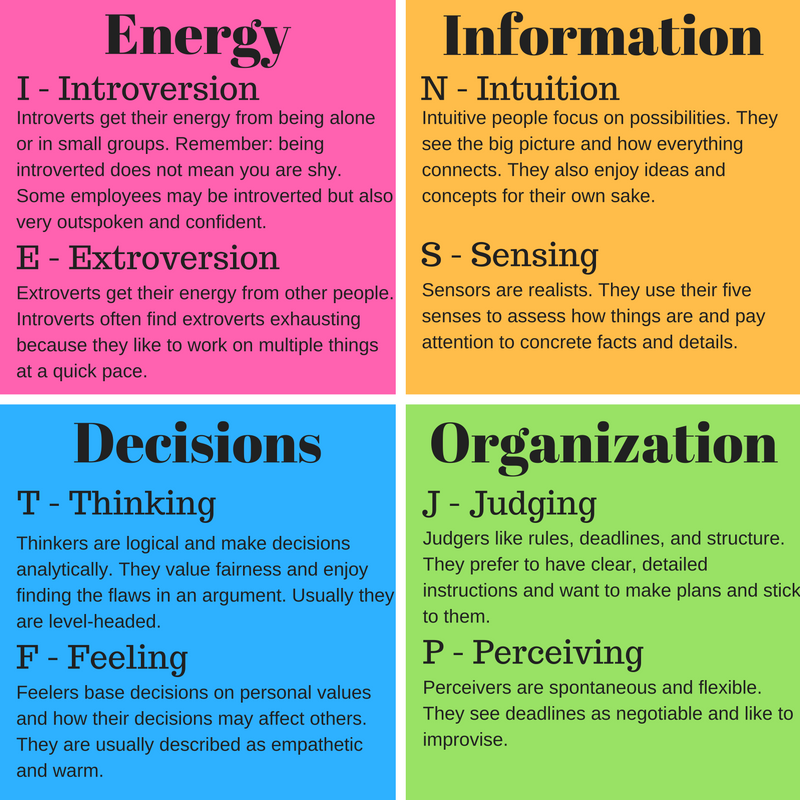Confident communication for introverts
Confident Communication Skills for Introverts
Source: bing
“There's zero correlation between being the best talker and having the best ideas.”
― Susan Cain, author of Quiet
Are you an introvert looking to strengthen your communication skills? When Susan Cain interviewed me in preparation for her future best-selling book, she had previously participated in one of my Communication Success workshops designed primarily for introverts. Since then, I’ve had the privilege of helping thousands of introverts significantly improve their personal and professional communication skills through hundreds of workshops and individual consultations.
The key to communication success for introverts is not to act like an extrovert, but to leverage the qualities of introversion with empowering communication skills, so you can achieve the best impact with minimum stress.
Below are tips to confident one-on-one communication in personal and/or professional scenarios, excerpted from my books, Relationship Communication Success for Introverts and Workplace Communication Success for Introverts. You may already be familiar with some of the skills below, and not all of the ideas may apply to you or your particular situation. Simply utilize what’s beneficial and leave the rest.
Five Quick Tips to Confident One-On-One Communication
1. Select a Suitable Physical Environment to Save Energy
Whenever possible, arrange for communication to take place at locales that are relatively quiet. Noisy environments tend to force both you and your conversation partner to speak louder, and may hamper you from thoughtful, reflective discussions. Since color and temperature affect emotions, avoid settings that are brightly lit or painted, which excite the senses and encourage revelry. Also, avoid environments that are uncomfortably warm, which may stir emotions but debilitate thinking (1)(2)(3)(4).
2. Easy Ways to Begin and Maintain One-On-One Communication
“Show interest in others, and others will show interest in you. ” ―Dale Carnegie
” ―Dale Carnegie
The two keys to being at-ease in one-on-one communication are to show interest in others, and ask questions about what they’re interested in. At the start of the conversation, ask open-ended questions about them. If you would like to keep a conversation going, simply select a piece of information your communication partner shared with you, and ask for more elaboration. Asking questions during a conversation is an easy way for introverts to participate actively without having to be too talkative. It has the multiple benefits of saving speech and energy, maintaining engagement, and being attentive to your partner.
3. Easy Ways to Buy Time and Organize Your Thoughts
During the communication, there may be times when you want to be more thoughtful and concise with what you’re about to say, but aren’t ready to speak right away. In these situations, you can “buy time” by letting the other person know that you need a moment to think. Say, for example:
Say, for example:
“Give me a second, I want to be very clear with what I’m about to say…”
“Let me have a moment to think this through…”
In our extrovert-oriented society, it isn’t always socially permissible to have a period of silence for thinking in the middle of a conversation. However, by introducing a preface which announces that you need a moment to think, you acquire the social permission to organize your thoughts.
4. Build Breaks Into Lengthy Communication
If the communication gets prolonged and you need to take a break, simply say that you wish to use the restroom, or get a drink of water, or retrieve something from your office or car, and will be right back. During your break, take a moment to surround yourself with solitude. Take nice, long breaths. If you use the restroom, put some cold water on your face, or in front and behind your neck to refresh.
5. How to Diplomatically Exit
When you’re ready to finish the one-on-one communication, give your partner a heads up that after your next comment or questions you’ll need to go do something else. Psychologically prepare the other person for a conclusion for an easier and graceful exit.
Psychologically prepare the other person for a conclusion for an easier and graceful exit.
For more tips on confident communication for introverts, see references below.
© 2014 by Preston C. Ni. All rights reserved worldwide. Copyright violation may subject the violator to legal prosecution.
Communicate Confidently as an Introvert - Social Skills Tips for Shy People
If you want to become a more effective communicator as a shy person, you’re not alone. So many people I chat with tell me how they would love to be better at conversation but are too afraid to put themselves out there.
We know the value of social interaction and how good it feels to have a lively and meaningful conversation with someone. So the question we’re answering in this video is not why we need to be a better communicator but how to be a better communicator as a shy person.
Sure, it requires some courage but that goes for extroverts as well. No one is 100% confident 100% of the time. Some types of social interaction and some people we engage with can leave even the strongest most confident communicators shaking from social anxiety.
Some types of social interaction and some people we engage with can leave even the strongest most confident communicators shaking from social anxiety.
Today I’m sharing 4 ways you can improve your communication skills and have more engaging conversations with people.
It’s true that sometimes we might need to muster up the courage to have a conversation, but once you’re communicating it’s time to truly be in it.
With that, let’s jump right in.
>>>
Focus On Listening
Listening is not as scary as speaking. You’re not as put on the spot. But don’t undervalue your role as listeners. It’s no insignificant responsibility. And there is a right way and a wrong way to listen. Let’s talk about the right way to listen showing interest in what the speaker is sharing. Be actively listening by nodding your head, leaning in, using discourse markers like “right, wow, cool, nice, hmm, ah hah” ..and so forth” because that shows that you care what the speaker is saying. Doing the opposite of that would be the wrong way to listen and believe me the speaker will pick up on it and make a mental note of it. Part of what makes a good communicator good is their ability to speak well but also listen well. So as a shy person, you may not necessarily want to do the talking in the beginning of the conversation, so listen more than you speak. Once you’ve warmed up to the person and are ready to speak, then you can do so. But don’t feel like you need to be super talkative right at the get-go. Give the other person a chance to speak as you warm up, and meanwhile you can showcase you’re extraordinary listening skills.
Doing the opposite of that would be the wrong way to listen and believe me the speaker will pick up on it and make a mental note of it. Part of what makes a good communicator good is their ability to speak well but also listen well. So as a shy person, you may not necessarily want to do the talking in the beginning of the conversation, so listen more than you speak. Once you’ve warmed up to the person and are ready to speak, then you can do so. But don’t feel like you need to be super talkative right at the get-go. Give the other person a chance to speak as you warm up, and meanwhile you can showcase you’re extraordinary listening skills.
Build On It
You should feel zero pressure to come up with the topic of conversation. Instead, build on what the speaker is sharing. Since you’ve been listening so closely, you’re able to ask follow up questions. For example, if the speaking is telling you about their workout you can follow up by asking how long they’ve been consistently working out.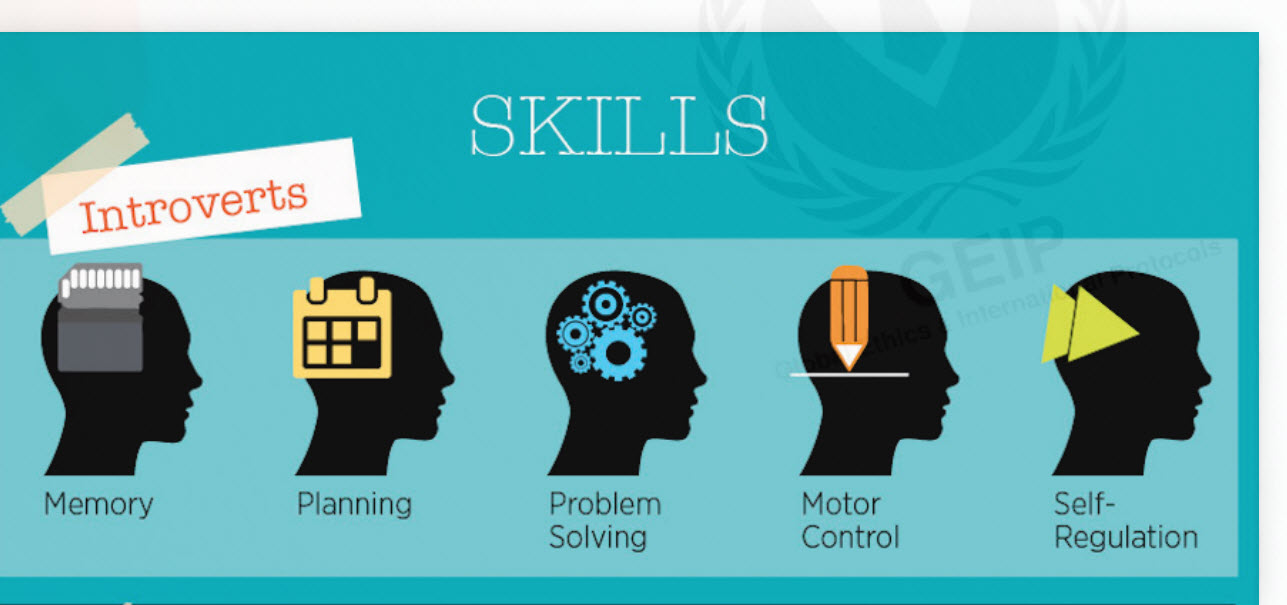 Alternatively, you can ask them what their favorite types of training are. The goal with building on the conversation is to take the pressure off of you to come up with new material. Use what you’ve got. Meaning, asking elaboration questions and clarifying questions are great ways to build on the current topic. If you’re on the topic of working out maybe it got you thinking about the great outdoors and now you’re on a related topic of hiking and other outdoor activities, that’s great! Keep building on the conversation. One of my favorite aspects of conversation is how fluid it can be. One of the most fun things is to allow the conversation to unfold naturally, let it ebb and flow without forcing it and it’s pretty magical. Suddenly someone might interject with “how did we even get on this topic” or “what was it that we were talking about, again?” That’s when you know you’re both really engaged in the conversation that you let it take on a life of its own. Good stuff!
Alternatively, you can ask them what their favorite types of training are. The goal with building on the conversation is to take the pressure off of you to come up with new material. Use what you’ve got. Meaning, asking elaboration questions and clarifying questions are great ways to build on the current topic. If you’re on the topic of working out maybe it got you thinking about the great outdoors and now you’re on a related topic of hiking and other outdoor activities, that’s great! Keep building on the conversation. One of my favorite aspects of conversation is how fluid it can be. One of the most fun things is to allow the conversation to unfold naturally, let it ebb and flow without forcing it and it’s pretty magical. Suddenly someone might interject with “how did we even get on this topic” or “what was it that we were talking about, again?” That’s when you know you’re both really engaged in the conversation that you let it take on a life of its own. Good stuff!
Can You Relate
Is there anything that the speaker is sharing that you can relate to? Do you have a similar experience or story to share? If they’re sharing an anecdote, reply with an anecdote of your own.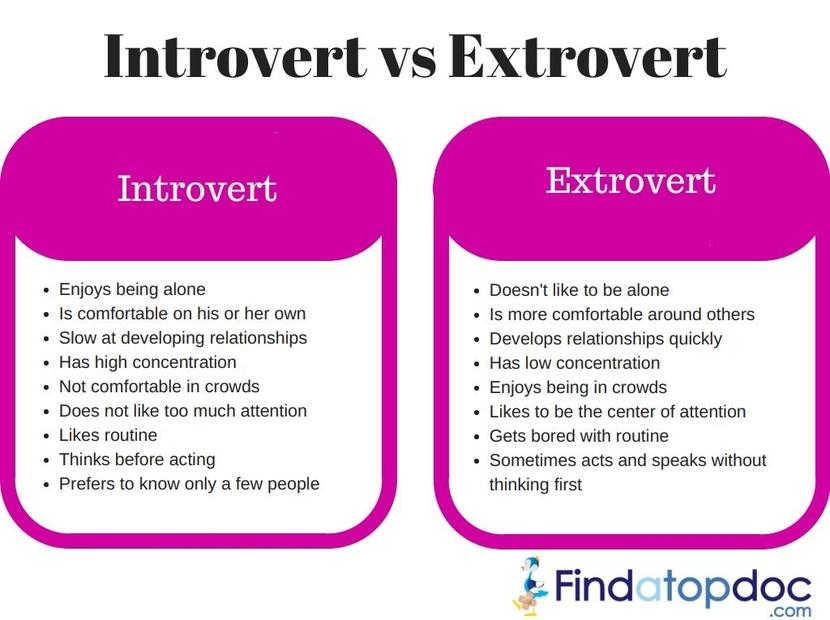 It shouldn’t be totally random, try to find a modicum of similarity. For example if there sharing something from their study abroad year in college, you could share something from when you studied abroad as well, if you didn’t go abroad you can share a story from your junior year of college. The point is to find some common ground. Again, this does not require you to work with new material, you’re using what they’re giving you. But you’re adding to the conversation and sharing your own stories and insights. What you’re brining to the table is unique in and of itself.
It shouldn’t be totally random, try to find a modicum of similarity. For example if there sharing something from their study abroad year in college, you could share something from when you studied abroad as well, if you didn’t go abroad you can share a story from your junior year of college. The point is to find some common ground. Again, this does not require you to work with new material, you’re using what they’re giving you. But you’re adding to the conversation and sharing your own stories and insights. What you’re brining to the table is unique in and of itself.
Express Yourself
We’re always communicating. Even when we’re silent we’re communicating. So don’t think that you can only communicate through speaking. There’s so much you can say with your body language and facial expressions alone. If you have an expressive face, great! Keep it up. If you don’t, then that could be something that you start incorporating in your conversations. Practice using hand gestures and practice making facial expressions. Even something so simple as a smile, nod, or raising or furrowing of the eyebrows is a great place to start. The point is, you can communicate through your expressions. Until you feel more confident to speak in the conversation, express yourself through your hand gestures and facial expressions while the person is speaking. Once you feel more confident, add words to your nonverbal communication! This will add that extra dimension to your message.
Even something so simple as a smile, nod, or raising or furrowing of the eyebrows is a great place to start. The point is, you can communicate through your expressions. Until you feel more confident to speak in the conversation, express yourself through your hand gestures and facial expressions while the person is speaking. Once you feel more confident, add words to your nonverbal communication! This will add that extra dimension to your message.
>>>
So those are four strategies to help introverts become more confident communicators during social interaction.
Honestly even extroverts have days where they might be feeling shy or timid. And that’s ok! No one is 100% impervious to social anxiety. We all have those moments where social interactions can feel daunting. So if you’re an extrovert or ambivert watching this, then these strategies will come in handy for you too!
>>>
Let's Recap:
- Focus on Listening: a good communicator is a good listener, show interest and be engaged
- Build On It: ask follow up questions, ask elaboration and clarifying questions, there’s no need to build new material, just work with what they’re sharing, you don’t have to reinvent the wheel
- Can you Relate: is there a similar experience or story you have to share?, share it, you bring new insights and fresh perspectives, making what you share unique
- Express yourself: your body language is communicating, your face is communicating, if you’re expressive with your face and hand gestures, you’re doing social interaction, keep it up! And if you’re not, then that’s something to be aware of and start incorporating more of
Practice these strategies and make them part of your communicator toolkit. They’ll enable you to participate in conversation even when you’re not feeling your most confident.
They’ll enable you to participate in conversation even when you’re not feeling your most confident.
>>>
Alright EXPLEARNERS that's it from me.
I’d love to hear your own ideas for improving conversation as an introvert or when someone is feeling shy.
Share that with me and the Explearning community in the comments down below.
And, if you loved this lesson, please be sure to let me know. You can give this video a thumb’s up on YouTube and if you haven’t done so already subscribe to join our tribe of Explearners, so you never miss a lesson. If you ring that bell, you’ll get notified about our new lessons. Email this video to a friend or coworker who also wants to improve their communication and supercharge their social skills.
While we’re at it, feel free to also share this with friends and family.
The writeups of these lessons are always available on our blog at explearning.co/blog.
With that, have an awesome week, Explearners.
Thank you so much for joining me and I’ll see you next time for your next Explearning lesson.
Happy Explearning ⚡
5 techniques that will help introverts successfully communicate with the outside world promotion.
Share
0Julia Hill
Psychologist, member of the Professional Psychotherapeutic League, blogger.
Hello. I'm Julia, I'm 42 years old. If you come to visit me unannounced, I will pretend that no one is at home. I will turn off my phone on my birthday. And I prefer an evening with a book on the couch to a corporate party. But first we need to get to know each other, and this is not easy. I come across as an arrogant and aloof person. But I can listen, and I prefer actions to empty chatter. If we become friends, it will be a long and trusting relationship. I am an introvert.
Introversion is not a diagnosis, but just a feature of the mental organization, in which the comfort zone is not outside, but inside us. It is cozy, warm and interesting. A fire-maned lion is running, Kant is dozing in an armchair, Bor is eager to talk. And all this with magical music. In general, all the conditions in order to have less contact with the outside world.
And all this with magical music. In general, all the conditions in order to have less contact with the outside world.
The problem is that society always has its own plans for us. Why would he care about our comfort? Are you an introvert or anyone else, please be kind enough to follow social norms. So sometimes you have to leave the usual shelter and be active. Make acquaintances, pass interviews, communicate with the boss, taxi driver, security guard and, most importantly, talk, talk, talk. Because we will either declare our desires ourselves, or they will remain unaccounted for. And this is unnerving.
How to overcome the obstacle course and maintain peace of mind? I will share five techniques that will help introverts harmoniously integrate into this insanely sociable world.
1. Forward technique
When you need it
If you need to ask for help, ask for a bonus from your boss, tell your neighbors that loud music is in the way, tell the seller that you have been cheated, make an appointment by phone, and so on.
How to use
A forward in football is an attacking player whose main task is to score goals. In fact, the forward defends the interests of the team by attacking. And this requires a certain amount of aggression. For introverts, aggression is directed inward, and not outward, so it is always difficult for us to ask, insist, and protect our interests. We also love to think out the reaction of the opponent: how he will react to the request, whether he will be angry, whether he will be able to answer or whether he is busy with important matters. In indecision, we can walk for hours.
Take the liberty of taking the first step and kicking the ball to the opponent's side. Act without thinking.
Start with everyday situations, and then transfer them to more significant ones for you.
The secret of this technique is to get out of the position of the beggar and take the place of the player protecting the interests of his team. Mentally shift the focus from yourself to your loved ones. Asking for someone is always easier. For example, you ask for a salary increase to pay for your son's courses; discount from the seller to buy more products for the family dinner. Remember also about the inner Kant: loud music from the neighbors prevents him from dozing.
Asking for someone is always easier. For example, you ask for a salary increase to pay for your son's courses; discount from the seller to buy more products for the family dinner. Remember also about the inner Kant: loud music from the neighbors prevents him from dozing.
2. As if
When you need it
On a date, at an interview, if you have to speak in public, at a crowded party, and so on.
How to use
Introverts tend to overthink and doubt everything. And the quality of thoughts, as you know, directly affects feelings and behavior. Let's go the opposite way.
Start behaving as if you were the life of the party, a charismatic speaker, attractive, sexy, easy - that is, possessing those qualities that you lack for self-confidence. Fake it until you succeed. Be proactive, smile, keep up the conversation, share knowledge and experience.
The more often you act like you are confident, the more confident you will actually become.

The emotions you experience will change the way you think. No miracle: even simulated positive emotions send signals to the brain, in response to which endorphins begin to be produced. In psychotherapy, this method is widely used in the treatment of various anxiety disorders.
The secret of this technique is to make "as if" a part of ourselves. An imaginary space where we can feel confident and uninhibited helps to relax and gather in various life situations.
3. Emergency exit
When you need it
During a decisive conversation, when making new acquaintances, at noisy events and other “obligations”.
How to use
I love this tactic because it's versatile and effortless. Introverts are forced to live in accordance with social norms invented by extroverts. “I must be sociable”, “I must show that I have fun”, “I must please”, “I must participate in wedding competitions”, “I must not worry” - these are just a few that I have heard over the years of my work. All these “shoulds” kill any sense of freedom and lightness in us and completely confuse us.
All these “shoulds” kill any sense of freedom and lightness in us and completely confuse us.
Develop for yourself your own set of rules, not forbidding, but allowing. Allow yourself to be yourself, to reckon with your characteristics and desires. For example:
- it is allowed to worry before an important acquaintance;
- allowed not to leave the house for three days after the interview;
- allowed to come to the party, check in and leave;
- it is allowed not to go to the second cousin's birthday party;
- just nod in conversation without answering.
And so on.
The secret of this technique is to stay in your own comfort zone in any unusual situation and be able to quietly proceed to the "emergency exit".
4. Energy-saving mode
When useful
At private or official receptions, if you work in open-space, when participating in lengthy negotiations, speeches.
How to use
During intensive communication with introverts, the same thing happens as with a smartphone battery in the cold: the charge drops before our eyes. And the remnants are only enough to escape from everyone and slam the door behind them with relief.
And the remnants are only enough to escape from everyone and slam the door behind them with relief.
In order not to reach complete misanthropy, learn to restore energy in time.
- Do not try to do everything and everywhere. Set short-term goals and move towards them step by step.
- If possible, plan no more than 1-2 public events per week.
- Allow time for proper rest after meetings.
- Take breaks in speeches and negotiations to be alone with yourself.
- Periodically leave a crowded workspace, go to a quiet cafe, go outside or just put on your headphones with your favorite music.
- When you arrive at a party, do not immediately rush to entertain others with conversations. Immerse yourself in the atmosphere gradually: look around, sit on the sofa, take a few photos, ask the host to introduce you to the guests.
- During the evening, go out to your balcony, garden, or other secluded place to replenish your energy and take a break from people.

- A book downloaded to the phone can be a good helper. A few minutes of reading will bring you to peace of mind.
The secret of this technique is not to waste your last energy on communication. Take breaks to re-energize by being in peace and quiet.
5. Socialite
When useful
In situations where you just need to make new acquaintances, communicate and make a good impression.
How to use
Let's be honest: introverts are not brilliant conversationalists. “What to discuss if everything is clear anyway,” we think. Is the weather bad, you say? Well, it's winter. Don't understand the new movie? What do you want, it's von Trier. What do I think about proper nutrition? I think this is a promising idea.
In situations where you still need to get to know each other and communicate, I suggest using the “Secular Lion” technique. People who are forced to frequent events don't put a lot of energy into the conversation, they have learned to have a superficial but pleasant conversation.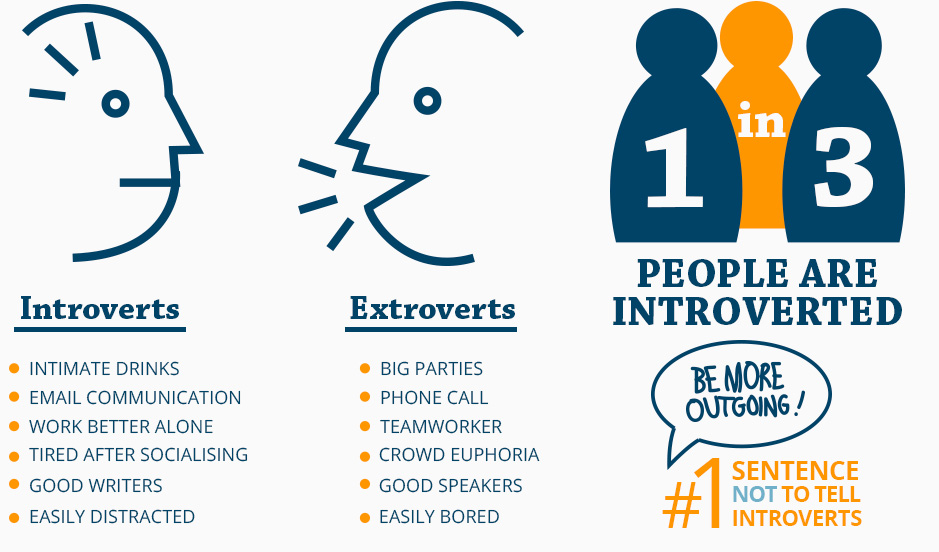 This skill can be mastered by anyone.
This skill can be mastered by anyone.
Small talk consists of opening, supporting, transitional and closing phrases. Learn a few in advance and build a dialogue using them as a constructor.
Opening phrases are an opportunity to start a conversation. For example:
- Good evening, I'm Julia. What a cozy place, right?
- Good evening, do you know what this music is?
- Hello, nice to meet you. I'm Anton, senior manager.
Supportive phrases are pertinent questions that engage in conversation. Examples:
- Do you like the topic of today's report? What seemed interesting?
- Have you read the new book by this author?
- Do you like Asian food?
Transitional phrases will help when the conversation begins to dry up and there is a frightening tension from the fact that there is nothing to talk about. Then you can return the conversation to what has already been discussed. For example:
- You said you were a doctor.
What profile?
- You mentioned children. Where do they study?
- We discussed the new film. How do you feel about theater?
Introverts have wonderful intuition. If you feel that the interlocutor is not in the mood to continue communication, it is better to end it. The closing phrases will help with this:
- Excuse me, I must leave you and greet my colleagues.
- I was glad to meet you. I wish you a good evening!
- Excuse me, but I have to take a call. See you later!
If your interlocutor decided to take his leave first, let him "escape" by briefly wishing him good luck. And don't forget that small talk lasts an average of 5-7 minutes.
The secret of this technique is to relax and not take the conversation too seriously. Small talk allows you to establish communication, while maintaining the distance that an introvert needs to feel comfortable.
Find the right way for you to overcome your fear of communication. Then it turns out that among those around you there are many people who are ready to respond and help, and those who, like you, take the first step with great difficulty, but in the end become your best friend.
Then it turns out that among those around you there are many people who are ready to respond and help, and those who, like you, take the first step with great difficulty, but in the end become your best friend.
Read also 🧐
- Temperament Test: Are you an extrovert or an introvert?
- How to survive a big event if you are an introvert
- 5 popular myths about introverts and extroverts
- How to survive a party if you are an introvert
- 30 comics that only introverts will understand
What to do if you don't want to communicate with people. Instructions for introverts
Irina Balmanji
Once upon a time there was a man. Not too sociable. In the mornings, he was terrified at the mere thought of going to the office and talking to people. In the evenings, he wanted to be alone as soon as possible, so he turned down all the offers of his colleagues to have dinner together. And on weekends, when his friends were "having fun" in noisy clubs, he would sit at home and read books.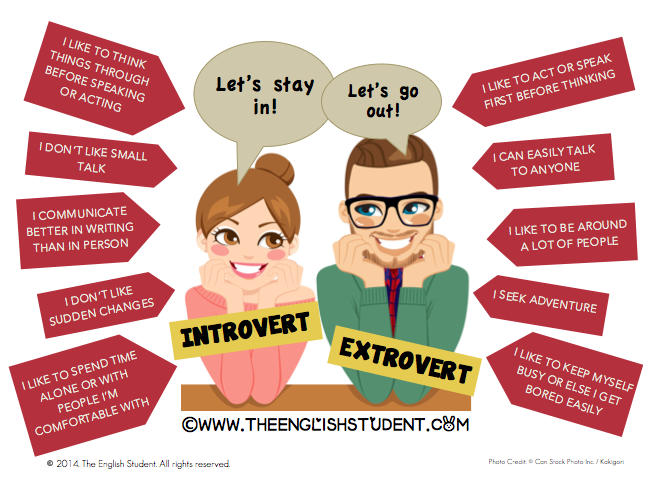
If you think that this story is about you, then you are a real introvert. Do not worry. Are you okay. But you need to learn how to live with pleasure, not waste energy and succeed in this noisy world where most people are obsessed with communication.
An introvert in the world of extroverts
Some people cannot live without communication and new experiences. For them, there is no worse punishment than being alone for a long time. They need constant external stimulation to feel energized and alert. After a busy day at work, they would rather go to a fun, noisy party than spend the evening at home with a book in their hands. They easily make acquaintances, make decisions quickly and begin to act almost immediately. These are typical extroverts. And they are the majority in our world.
Today, many people believe that this is the only way to achieve success and recognition. The qualities of an extrovert are indeed very important in a variety of areas, for example, in a business where the emphasis is on teamwork, or sales. Generally, outgoing people are perceived as friendlier, more confident, and more helpful. Sometimes it seems that there is simply no place for introverts in the modern world.
Generally, outgoing people are perceived as friendlier, more confident, and more helpful. Sometimes it seems that there is simply no place for introverts in the modern world.
For an introvert, dealing with reality can be a real torture. Source
Does this mean that there is something wrong with quiet, thoughtful, solitude-loving introverts? And do they have to break themselves in order to adapt to the demands of our crazy world? Of course not. If only extroverts inhabited the planet, we would not have Sir Isaac Newton's law of universal gravitation, Albert Einstein's theory of relativity, Frederic Chopin's nocturnes, George Orwell's 1984, Steven Spielberg's Schindler's List, Sergey Brin and Larry Page's Google, Harry Potter by JK Rowling, Sunflowers by Vincent van Gogh.
It's time for all of us to get rid of our preconceived notions of introversion.
Do not confuse introversion with shyness: extroverts sometimes have this quality. A shy person is afraid of making a bad impression on others, but at the same time, he may want to communicate more.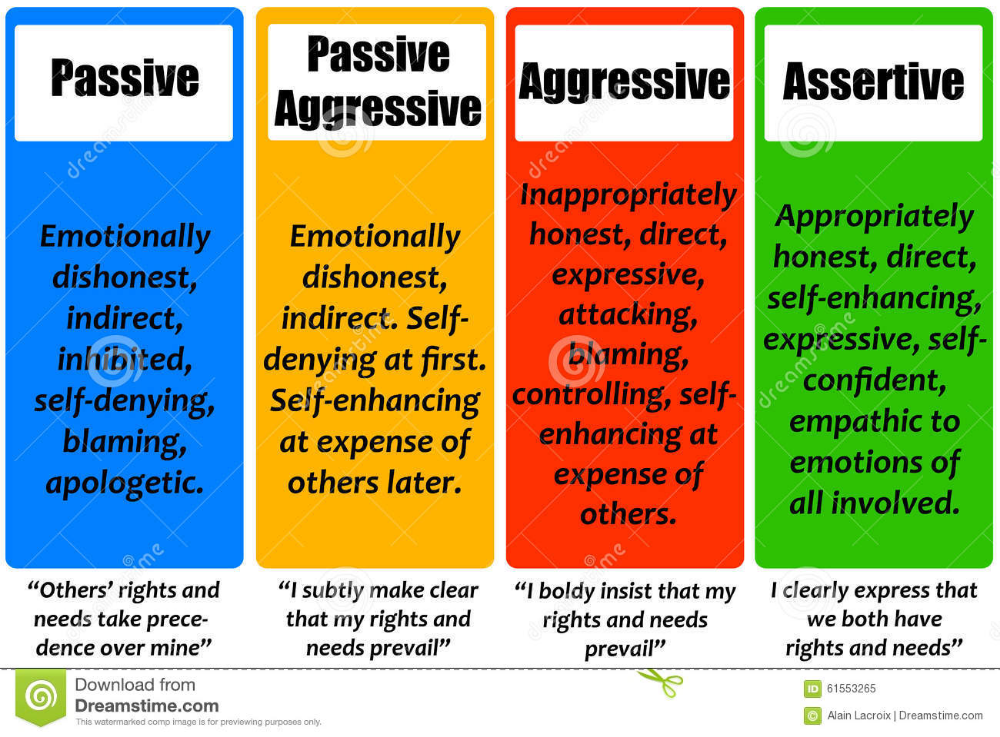 An introvert is simply tired and exhausted by an excess of external stimuli - vanity, noise, chatter.
An introvert is simply tired and exhausted by an excess of external stimuli - vanity, noise, chatter.
Shyness and shyness can be fought, but temperament is given to us from birth and cannot be changed. Source
The main difference between an extrovert and an introvert is what gives each of them strength and what takes them away. An introvert draws energy from himself. In order to be cheerful and balanced, he needs full access to his thoughts, feelings and sensations. And an extrovert is literally charged from the outside world. He is just happy if there are a lot of people around and life is seething around.
Despite all prejudice, introverts can be just as confident, friendly, curious, and successful as extroverts. They just need much more silence, peace and solitude.
Choose what suits you
Accept yourself for who you are. Stop feeling guilty about turning down an invitation to dinner in favor of reading a good book. If you like to dine in a restaurant all alone, feel free to do so. And, of course, there is nothing wrong with the fact that you prefer serious, meaningful conversations with your best friend to noisy parties.
And, of course, there is nothing wrong with the fact that you prefer serious, meaningful conversations with your best friend to noisy parties.
Spend your free time the way you like it, not the way you think it should be done. Stay at home on New Year's Eve if that makes you happy. Skip pointless meetings. Cross over to the other side of the street to avoid idle chatter with casual acquaintances.
For an introvert, as for any person, relationships are important, but you should look for quality in them, not quantity. A narrow circle of friends is enough to be happy. Treasure loved ones, take care of them. Work with those colleagues whom you treat with sympathy and respect. Search among new acquaintances for those who you like. And don't force yourself to communicate with everyone else.
Spend energy only on the elect. Source
Seek to find an interesting, inspiring job that will use your strengths: perseverance, deep thinking, concentration, insight and sensitivity. While extroverts tend to excel in the public sphere, introverts tend to excel in theoretical and aesthetic activities. In many areas (for example, in art or science), it is impossible to achieve serious results without solitude.
While extroverts tend to excel in the public sphere, introverts tend to excel in theoretical and aesthetic activities. In many areas (for example, in art or science), it is impossible to achieve serious results without solitude.
The ideal option for an introvert is a home office. But if you are forced to work in a team, think about how to minimize the noise and fuss that distracts you from important tasks. Maybe you will agree with your superiors on a personal account and take on projects that do not require teamwork.
When you can put on the mask of an extrovert
A significant part of our personality is determined by genes, brain, nervous system. Nevertheless, we are able to adapt to the environment and expand the boundaries of our capabilities to a certain extent.
No introvert can become an extrovert. At the same time, almost everyone can learn how to maintain small talk, speak in public, contact strangers, and behave calmly and naturally during meetings.
Some introverts manage to hide their true selves for years. Of course, this should not be done. In many cases, it's better to stay in your comfort zone. However, sometimes circumstances force us to adapt to the world of extroverts. When there are no other options, you can pretend to be a little more active and sociable. But only for a while.
Introverts often have significant social and business meeting skills. Source
You don't have to wear an extrovert mask to live up to someone's expectations. But it can be put on briefly for key personal projects, for a job that you think is truly important, as well as for the people you love, or anything that you highly value. The main thing is to apply this method within reasonable limits and not forget about your true needs.
If you're doing something out of character for one of your key personal projects, don't suppress your character too hard or for too long. To avoid burnout, try to create "recovery niches" in your daily life. It could be a place where you go to be yourself (like the nearest park) or a period of time (say a short break between business calls).
It could be a place where you go to be yourself (like the nearest park) or a period of time (say a short break between business calls).
Make an agreement with extroverts
It is not uncommon for introverts to marry or befriend extroverts. In such an alliance, it can be difficult for people to understand each other's needs: one person wants to have a party, and the second wants to spend time together; one dreams of going somewhere on the weekend, and the other is quite satisfied with a cozy sofa, favorite book and family board games.
There is no point in arguing over whose vacation option is better. It's just that what suits an introvert can be tedious and boring for an extrovert. And vice versa. The only way to peacefully coexist is to make an agreement whereby everyone gets what they need.
The ability to compromise is the key to a strong relationship. Source
For example, you can agree to go out half the time and stay at home half the time.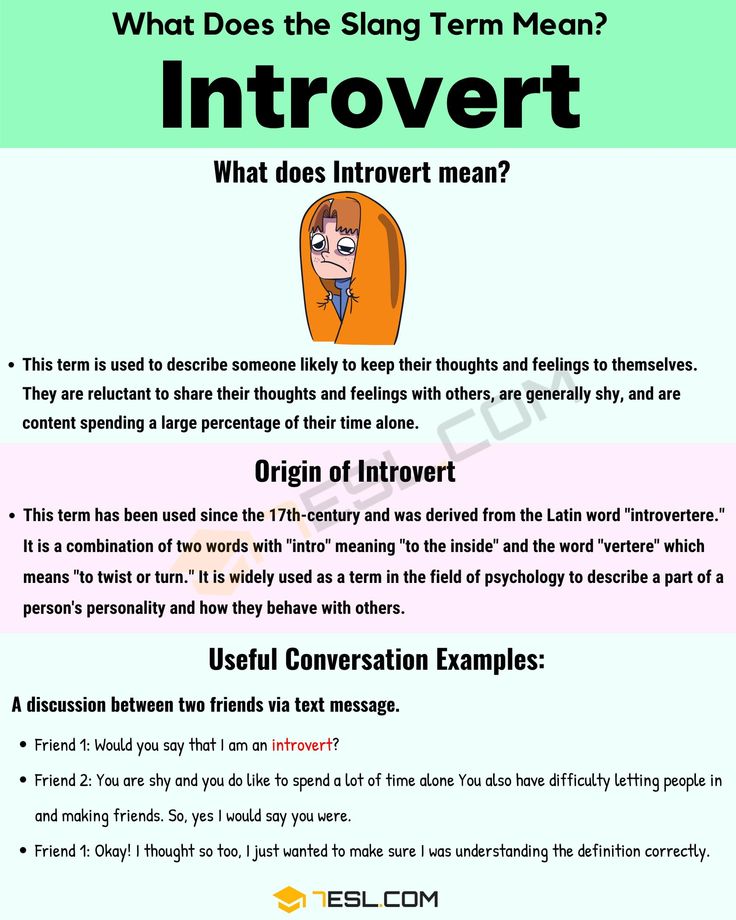 The agreement also applies in the case when you come to your best friend for a bachelorette party, and she is sympathetic to your absence for three days on the eve of the wedding.
The agreement also applies in the case when you come to your best friend for a bachelorette party, and she is sympathetic to your absence for three days on the eve of the wedding.
Be sure to discuss these rules with loved ones who are prone to extraversion in order to protect them and yourself from conflicts, ridiculous insults and misunderstandings in the future.
Make an agreement with yourself
In some situations it is useful to agree with yourself. For example, if you live alone but want to find a loved one, you will have to force yourself to attend public events. It makes sense to decide in advance how often you can go out - once a week, month or quarter. As soon as the quota is met, you will have the right to stay at home without remorse.
Or, let's say you dream of starting your own company and working from home. In this case, you need to spend some time establishing a business relationship. Enter into such an agreement with yourself: once a week you will attend an event and make one useful acquaintance. On other days, you can relax and live the way you like.
On other days, you can relax and live the way you like.
How to raise an introverted child
If your child prefers solitude and his own fantasies to noisy games with peers, then you are definitely growing up as an introvert. And, of course, you must help him cope with the rumbling outside world.
Do not try to fill all the child's free time with some extra activities and do not force him to communicate with those who are unpleasant to him. It is already difficult for him to survive the school day. Do not mind if he wants to retire to his room or leave the birthday party a little earlier than other children.
Explain to an introverted child why he gets stressed when he is in noisy company for a long time. Let him know that his feelings are completely natural. Think together about how often he should meet with friends and when is the best time to do so. Develop and discuss strategies to help you stay calm and energized throughout the day.
At school, introverts constantly find themselves in situations that are uncomfortable for themselves, so they cannot fully demonstrate their abilities. Treat this with understanding and start devoting more time to independent work at home. Or consider transferring your child to family schooling.
Treat this with understanding and start devoting more time to independent work at home. Or consider transferring your child to family schooling.
Being in a classroom is a real challenge for an introverted child. Source
In most cases, introverts have one or two major hobbies (such as drawing, constructing, or writing stories) that are not always shared by their peers. Praise your child for doing their hobbies, encourage and help find like-minded people. He will benefit from a certain participation in collective work. However, this work should be done in small groups (two or three people each).
Do everything possible so that the child acquires the necessary communication skills, learns to calmly perceive new situations and new people, but otherwise let him be himself and in no case try to save him from introversion. Rejoice in his original thinking. Be proud of the strength of his consciousness and loyalty to friends. And sincerely praise when he succeeds in his favorite activities.




